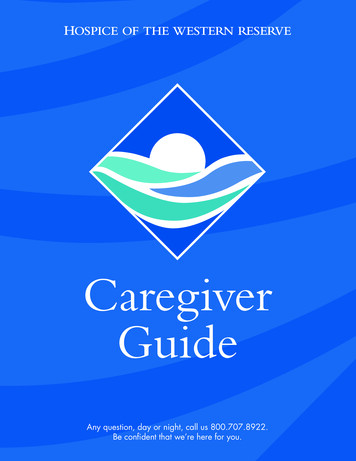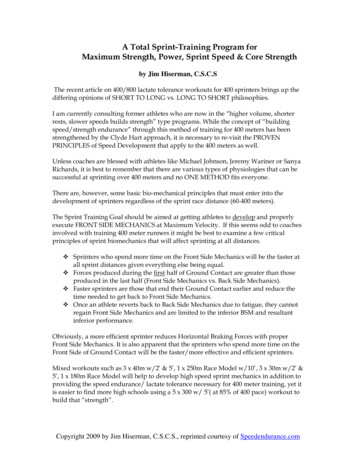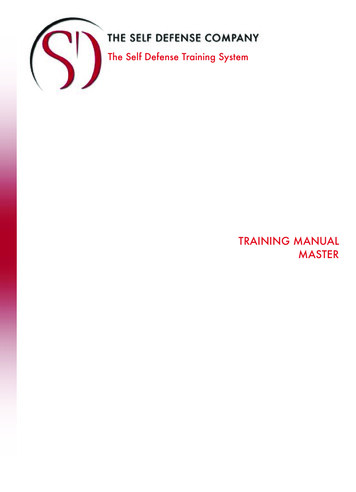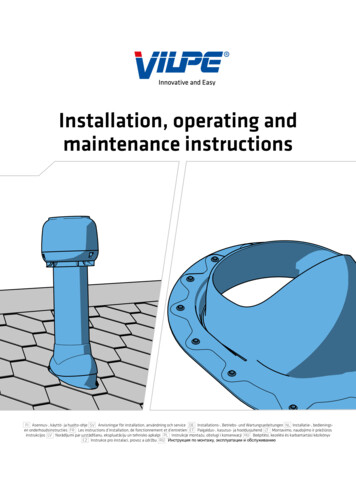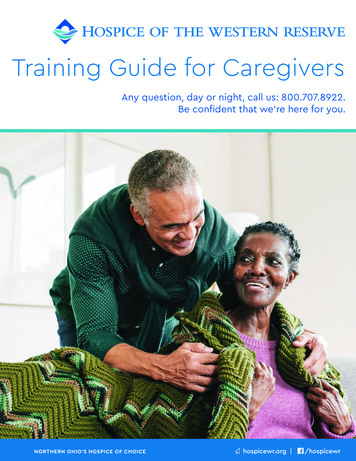
Transcription
Training Guide for CaregiversAny question, day or night, call us: 800.707.8922.Be confident that we’re here for you.NORTHERN OHIO’S HOSPICE OF CHOICEhospicewr.org /hospicewr
OUR MISSIONHospice of the Western Reserveprovides palliative and end-of-life care,caregiver support, and bereavement servicesthroughout Northern Ohio.In celebration of the individual worth of each life,we strive to relieve suffering, enhance comfort,promote quality of life, foster choice inend-of-life care, and supporteffective grieving.
WELCOMEWelcomeEach member of our paid andvolunteer staff is committed to providing compassionate, exceptional care. We are honored that youand your loved one have placed your trust in us and promise to focus on your priorities, values andgoals of care. Your care team includes your loved one (the terminally ill person), you and other familycaregivers and your hospice care team members. Our shared goals are directed by the patient andloved ones.THANK YOU FOR CHOOSING HOSPICE OF THE WESTERN RESERVEHospice care is dedicated to personal choice. Your care team members are committed to ensuringyour healthcare choices are respected. They will provide physical assistance and medical care whilesupporting your emotional and spiritual wellbeing.This caregiver training guide offers information that you may need to supplement the services thatwe provide. It is not meant to be a substitute for our care or services. It delivers quick reference topractical information. We have included website links to training videos created specifically for thehome caregiver. These may be particularly helpful. Our website, hospicewr.org, also has numerousother resources that were created to help make home caregiving easier and more enriching.We are available 24/7 to answer your questions, alleviate your concerns and ease your burdens. Donot hesitate to call anytime, day or night.It is a privilege to be invited into your life and home and to play a role in your journey.Sincerely,William E. FinnPresident and CEOHospice of the Western Reservehospicewr.org/caregiver-training1
Contents Introduction.4Hospice Care Team Members.5FAQs about Hospice Care .6On-Call Service.7Hospice Care in Assisted LivingCommunities & Nursing Centers.7Peaceful & Proud Veterans Care.8Western Reserve NavigatorPalliative Care Services.8Services at Hospice Inpatient Care Units.9Extended Care/Continuous Care. 10Patient Travel Information. 10 Symptom Management. 11Pain. 12Shortness of Breath. 13Anxiety. 13Restlessness. 13Fatigue. 13Helpful Relaxation Techniques. 14Seizures. 14Mental Changes or Delirium. 14Nausea and Vomiting. 15 The Role of Nutrition.16Difficulty Swallowing. 16Thickened Liquids. 16Decreased Appetite. 16Mouth Care. 16 Medications.17How to Make Medication Time Easier. 17Side Effects of Medications. 17Medication Disposal. 18 Oxygen.19Oxygen Safety. 19Oxygen Use. 19Oxygen Problems. 192Caregiver Training Guide Safety and Prevention.20Preventing Infection.20Respiratory Hygiene.20Coronavirus 2019 (COVID-19).20Influenza (Flu).20Shingles.20Blood-Borne Pathogens. 21Prevention of Bleeding. 21Preventing the Transport of Bed Bugs.22Home Safety.22Emergency Response.23Emergency Medication Distribution.23Evacuation.23Sheltering in Place. 24Tornado Safety. 24 Providing Physical Assistanceto Your Loved One.25Ambulating with Your Loved One.25Assistance Using a Bedpan.25Assistance Out of a Bed to a Chair.26Caring for the Bedbound Patient.27Assistance Using A Commode. 27Giving a Bed Bath.28Positioning Your Loved One.28Providing Mouth Care. 29Pulling Up a Loved One in Bed. 29Changing Bed Sheets.30Assistive Equipment Use.30Caring for a Catheter. 31 Cardiopulmonary Care. 32Chronic ObstructivePulmonary Disease (COPD). 32Heart Failure. 32Symptoms and Interventions. 32
Caregiver Needs.40Final Days. 41Important Things to Attend toWhen Someone Dies. 43 Reference. 54The Hospice Medicare Benefit andOther Insurance Coverage. 54Hospice Eligibility Explained. 54The Hospice BenefitPeriods Explained. 54Medicaid. 54The Champs (TRICARE Insurance)Program. 54Private Insurance. 54Financial Responsibilities. 55Billing. 55Patient Responsibilities. 56Patient and Family Bill of Rights. 56Grievance Procedures. 56Patient Privacy and Confidentiality. 57Ethics Committee. 58Non-discrimination Statements. 59Español. 60TABLE OF CONTENTS Dementia Care.34Caring for Yourself.34Disease Progression.34Dementia Symptoms. 35Communication. 35Pain and lowing. 37Interventions in Dementia Care. 37Communicating with Music/Importance of Touch.38Unique Grief and Lossfor Dementia Caregivers. 39 Grief and Loss.44 Personal Planning.46Advance Care Planning.46The Living Will.46Healthcare Power of Attorney.46Do Not Resuscitate (DNR)Comfort Care Protocol.46Organ and Tissue Donation. 47Memorial Planning. 47Personal Information andRecords Checklist .48Memorial Worksheet. 50Memorial Planning. 51Probate. 52Financial Power of Attorney. 52VA Benefits. 52Giving Back. 53hospicewr.org/caregiver-training3
Introductionfor the patient and support for you - the caregiver. We work tomanage pain and other symptoms of illness. Staff and trained volunteers provide emotional support and canhelp your whole family explore spiritual questions that often arise when someone is terminally ill. You andyour loved one are always in control of the care plan.HOSPICE CARE PROVIDES COMFORTHow do you help someone who is dying?Hospice workers are often asked that question. Theanswer can’t be found in techniques or textbooks.Medications and treatments are important, butthe real work of hospice is being physically andemotionally present. Sharing the final stage oflife’s journey with someone who is dying is themost important thing you can do for them. Simplybe there.This caregiver training guide was created byour staff members working as a team. Allow itto provide you with an immediate source ofinformation and to answer many of the questionsyou might have as you and your loved ones gothrough this journey.4Caregiver Training GuideConfidence in Your CaregivingDuring this stressful time, your care team strives tohelp you feel more confident in providing care andsupport to your loved one. We will provide youwith medication education, medical information,telephone guidance and ongoing discussions as thedisease progresses.We continually assess both you and your lovedone. We want to hear what you feel, see and needthroughout this time. Your care team will checkin frequently asking: “How can we help you feelmore confident as a caregiver? How can we helpyou feel more comfortable providing care for yourloved one?”Whatever your questions and concerns may be,please let us know. We are here for you, too.
Hospice Care Team MembersSpecially qualified and trained team members provide hospice services. The individual receiving careand their caregivers are vital members of the care team. Together, the team creates a plan that maintainsindividual dignity and ensures all physical, emotional and spiritual needs are taken care of.A Hospice Nurse visits on a regular basis toperform physical assessments, provide educationand training about medications, care for physicalneeds and update the doctor. Your nurse is avaluable source of knowledge.Your Social Worker helps you and your lovedones explore care options, finds other communityresources and offers emotional support. Socialworkers are available for individual and familysupport. Our social workers are dedicated tohelping the patient and their family with the manyareas of life impacted by an illness.Hospice Nursing Assistants often have the mostfrequent interactions with patients; they can be agreat source of helpful information. Our nursingassistants are experienced in hospice and palliativecare. Each holds the specialty certification, STNA,meaning they have additional training and havepassed an exam administered by the State of Ohio.They offer important personal care and assistancewith bathing and dressing. They are also presentfor emotional support.Spiritual Care Coordinators explore ways to findjoy, meaning and purpose in life, even at the end oflife. For those who have a religious faith, this mayinclude working closely with your spiritual advisorand faith community. Everyone can benefit from alistening ear, guidance and willingness to exploreuniversal questions, forgiveness and hope.Art and music experiences by Therapists,Volunteers and other members of your hospicecare team can enhance visits, provide symptomrelief and allow opportunities for life review andthe creation of legacies.The Pharmacist strives to relieve pain and manageother symptoms with minimal side effects andmaximum benefit.A Dietitian provides suggestions on nutrition andsymptom management.Overnight and Weekend Team Members assureaccess to care 24 hours a day, seven days a week.Your loved one’s comfort and your comfort level asa caregiver are our priority.A Bereavement Coordinator trained insupporting those who are grieving, offerssupportive services to family members andsignificant others during the 13 months following adeath.Volunteer Service Managers help identify areasin your life where a volunteer may offer assistance.They discuss volunteers’ roles with patients andtheir loved ones before asking a volunteer to jointhe team.Volunteers are valuable members of your teamand a great source of support. Volunteer staffreceive extensive education and are dedicated tomaintaining the patient’s privacy and dignity.Volunteers can help in many ways: Providing a friendly visit or respite for acaregiver Offering spiritual care support End of Life Doula support through legacy work,life review, vigil planning and vigil presence Support for pet needs through Pet Peaceof Mind , to include walks, feeding andtransportation to veterinarian visits Assisting with occasional housekeeping andmeal preparation Providing simple legal assistance Making periodic phone calls through check-inprograms to ensure patient needs are met Providing support to veterans through ourPeaceful & Proud Program Delivering comfort massage or Reiki Helping fill a special request to bring fulfillmentand comfort through the Moments toRemember program (If your loved one hasa special request or wish, please tell a DUCTIONA Primary Care Physician is responsible forcontinued medical management of your loved one’scare. The Hospice Physician acts as a resource forhospice medical care and reviews the plan of careon a regular basis.
Frequently Asked Questions about Hospice CareQ: WhatINTRODUCTIONA:is hospice care?Hospice is compassionate, comfort-oriented carefor the terminally ill with an emphasis on painmanagement, symptom control and spiritual andemotional support for the patient and family. Ahospice physician certifies that a patient has aprognosis of six months or less if the disease runsits expected course.Q: Wherecan hospice care be provided?A: Care is provided anywhere a patient calls “home”such as a private home, group home, nursing orassisted living facility, one of our inpatient hospicecare units (“hospice houses” - see page 9) or ahospital.Q: Howlong can a patient receive hospice care?A: At admission, a physician certifies the disease hasadvanced to the point that the patient has monthsrather than years to live if the illness runs itsexpected course. Each week, the patient’s hospicecare team re-evaluates and monitors if the patient’scondition remains appropriate for hospice care.Re-certification occurs at the three-month andsix-month points and every two months thereafter.Sometimes, patients experience improved healthand do not need continuing hospice support. Iftheir condition deteriorates later, they can bereadmitted.Q: Whopays for hospice care?A: There are no out-of-pocket costs for any services ormedications related to the patient’s terminal illness.Hospice of the Western Reserve is a Medicare/Medicaid certified hospice program, offering acomprehensive Hospice Benefit. This benefitcovers the cost of all hospice care team services,medications and treatments related to the terminalillness, medical supplies and durable medicalequipment. Many medical insurance companieshave similar plans that cover hospice services.Q: Doesthe patient keep their own doctor?A: Yes, hospice patients may continue to be servedby their own physicians. Hospice team memberswork with each physician, serving as a liaisonbetween physician, patient and family. We also6Caregiver Training Guidehave physicians who are certified in hospice andpalliative medicine and nurse practitioners onstaff. If you wish to change physicians or if thepatient does not have a primary care physicianand wishes for one of our hospice physicians ornurse practitioners to oversee care, please notifythe hospice care team.Q: Whatif the patient moves during hospicecare?A: A transfer to another Medicare-certified hospicecan be arranged by your hospice team.Q: Whatif the patient no longer wants orneeds hospice services?A: We will always honor the wishes of the patient ortheir designated representative for care. If servicesare no longer needed or desired, the patient mustsign a discharge form. There are times when apatient’s condition stabilizes; the hospice careteam will discuss discharge. The patient may thenjoin our Western Reserve Navigator program(see page 8) and a team member will call and visitperiodically to check on the patient’s condition.If you notice changes in the patient’s physicalhealth, do not hesitate to call us. Hospice serviceswill always be available when needed.Q: Howdoes Hospice of the Western Reserveoffer support to caregivers and other lovedones?A: Weprovide support from clinical staff, personalcare for the patient, counseling, art and musicexperiences, spiritual care, pharmacy services andmore – all of which help caregivers return to therole of spouse, child, parent or friend. We offercaregiver respite if family members need a breakfrom the stress of caregiving. Our social workerscan help navigate the complexities of terminalillness. Our volunteer program is available tocreate Moments to Remember for patients andfamilies by helping them create memories andachieve special wishes. Our bereavement staff isavailable to help loved ones manage their grief.
On-Call ServicePlease refer to the Communication Card onthe back of this booklet for names and contactnumbers. Keep it in an easily located area in thehome.If you call for support after 4:30 p.m., or onweekends and holidays, our answering service willpromptly answer. The operator will request thepatient’s name and the reason for your call. Theywill then ask you to hang up and not to use yourtelephone while awaiting the call back. The on-callteam member will be notified and will return yourcall within 15 to 20 minutes. If your call is notreturned in 15 to 20 minutes, please call again.If there is a change in the patient’s condition,call Hospice of the Western Reserve first. Ifsomeone has called 911, please notify Hospice ofthe Western Reserve as soon as possible so wecan assist with care coordination.Provide the hospital registration clerk with thepatient payment ID card you received from yourhospice care team.Assisted living communities and nursing centershave become more common and popular. Manyyounger and healthier people are entering seniorcommunities with the intention of aging in place,even as their medical needs change. The medicalcommunity refers to all these living environmentsas “alternative home” settings. They include:assisted living, nursing facilities, long-term carecenters, group homes or other residential caresettings.INTRODUCTIONQuestions, concerns and problems often occurat night, on weekends and during holidays. Weencourage caregivers to use our on-call servicewhen these needs arise. We want you to feelconfident calling for support. A team member isalways available to speak with you to address yourconcerns and provide help. The Hospice of theWestern Reserve office number will always work,24/7, day and night.Hospice Care in AssistedLiving Communities &Nursing CentersPeople living in long-term care settings mayreceive hospice care. We have dedicated Hospiceof the Western Reserve teams that partner withalternative home staff to provide hospice care forindividuals who live in these settings. We providethe same support and care for a resident there as wewould for a person living in a private home. Eventhough your loved one is living in a facility, youare still a caregiver. Please refer to Page 4 to seeways our support can help you feel more confidentand comfortable in this role. All of our servicesare included: expertise in pain and symptommanagement, grief support, ongoing consultationand access to our on-call hospice staff. By workingtogether, we enhance the residential facility’sexcellent services.If the patient is eligible for the hospice benefit,supplies, equipment and medications needed as aresult of the serious illness will be covered.The charge for room and board is not coveredunder the Medicare Hospice Benefit. If the patientis living at home, but expects to enter a long-termcare facility, your hospice social worker will helplocate a facility that works in collaboration withHospice of the Western Reserve.hospicewr.org/caregiver-training7
INTRODUCTIONADDITIONAL SERVICESPeaceful & Proud:Personalized Care for VeteransWestern Reserve NavigatorPalliative Care ServicesTO MEET THE SPECIAL NEEDS OF VETERANS, Hospiceof the Western Reserve has developed the Peaceful &Proud program. Through Peaceful & Proud, Hospice ofthe Western Reserve's paid and unpaid staff receivetraining in trauma-informed care and other emotionalissues for veterans, such as remorse or regret, anxietyand substance abuse.WESTERN RESERVE NAVIGATOR is a non-hospiceprogram offered through Hospice of the WesternReserve. It is a palliative care program which worksto provide a specialized care model for patients andtheir families living with a serious illness. WesternReserve Navigator provides supportive and palliativecare services to those who could benefit fromsymptom management, emotional support, and/orcommunity resources to enhance their quality of life.We not only work to support our patients but alsotheir families. We are your eyes and ears, working withyour physician to keep you comfortable at home andout of the hospital.Veterans are assisted with ethical wills, storytelling,expressive therapies using music and art, veteran-toveteran volunteer pairing, spiritual care and counseling,resources and benefits for veterans and dependents.We recognize veterans for their military service with anHonored Veteran pin.Hospice can be provided in a patient’s home, at ourinpatient hospice care centers, hospital and assistedliving communities or in VA contracted facilities foreligible veterans.Hospice of the Western Reserve has earned a Level 5designation in the We Honor Veterans program, thehighest level a hospice can achieve.Results of Western Reserve Navigator include: Fewer trips to the ER and admissions to thehospital A decrease in caregiver stress Improved coordination of healthcare services Increased health information and referral tocommunity resourcesPatients in this program may receive palliative careand curative care at the same time. You may remain inthe Navigator program for as long as needed and canbe admitted to hospice later if necessary.Through Western Reserve Navigator, an AdvancedPractice Registered Nurse (APRN) and Social Workerwill assess for medical needs or social support andfollow up based on those needs. We also have trainedvolunteers to access in several roles. Registered Nursesupport is available for medically based phone callsand needed follow up. You will have access to caringsupport 24 hours a day, 7 days a week.8Caregiver Training Guide
Services at Our HospiceInpatient Care UnitsFor additional information such as smokingpolicies, transportation, advanced directives and DoNot Resuscitate orders, medications, personal itemsto bring with you, insurance and billing, room andboard charges and physician and nurse practitionerservices, please refer to our Guide to Amenities andServices and Inpatient Unit Admission Guide.Respite CareA patient may be admitted for five days of RespiteCare if their caregiver needs a short interval ofrest from caregiver duties. The caregiver mustintend to resume caregiving after the respiteadmission.Levels of Care Provided at ourHospice Inpatient UnitsAn extension of up to five additional days ofrespite care may be approved in extenuatingcircumstances. In these situations, the patientmust be transitioned to the Routine Level ofCare. Room and board fees will apply for anydays beginning on the sixth day. Extensions tothis level may only be provided in contractednursing facilities or a hospice inpatient unit.Your hospice care team, in collaboration with yourattending physician, will determine if a change inyour loved one’s level of care is necessary.Room and board charges apply beginning onday six.Residential (Routine) CarePain and Symptom Management/General Inpatient Level of Care (GIP)Short-Term Residential Care assists patients whoare unable to care for themselves, have limitedcapacity or no family caregiving resources.Hospice of the Western Reserve is committedto providing Short-Term Residential Care(prognosis of four to six weeks) at our hospiceinpatient units on a limited basis based on bedavailability. Eligibility criteria and room andboard charges apply.At times, admission to an inpatient hospice unitmay be necessary and recommended to addressa patient’s pain or other symptoms that cannotbe optimally or feasibly managed at their currentlocation. This level of care ends when your hospicecare team determines that pain or other symptomsare optimally managed.Discharge plans must be discussed beginningat the time of transfer/admission. Anticipatedday of discharge will be communicated oncethe effectiveness of the plan of care has beendetermined. In some situations, symptoms becomemanaged quicker than anticipated. In those cases,the patient must be changed to the Routine Levelof Care or discharged.Patients often return to the same residence oncepain and symptoms are controlled or optimallymanaged. If this is not an option, the hospice teamwill assist in transitioning to an alternate caresetting. While a patient remains in the GIP levelof care, there are no room and board charges.In some situations, a patient’s care needs or goalsmay lead to your hospice care team recommendingINTRODUCTIONHospice of the Western Reserve offers three homelike inpatient hospice units (“hospice houses”).They all offer an array of services to meet patients’and loved ones’ needs.or requiring that they be admitted to a contractedhospital for the General Inpatient Level of Care.Home Away from Home inthe Final Days OptionWhen an illness brings a short life expectancy(typically one to 14 days), there may be a needto move a patient from their home or hospital toone of our hospice inpatient units. This optionprovides a comfortable, safe and peaceful homeaway from home in the patient’s final days. Thisgives loved ones access to a 24-hour hospice careteam to assist with direct care needs. Family andfriends have the opportunity to focus their timeand attention on supporting and being presentwith the patient and each other. Eligibilitycriteria apply to this program. Please ask to speakwith a hospice team member if you feel thismay apply to your situation. Room and boardcharges apply.hospicewr.org/caregiver-training9
INTRODUCTIONExtended Care/Continuous CareContinuous Care is a level of care that addressespain, nausea, shortness of breath or other hardto-manage symptoms that may require moreintense skilled care than can be managed at thepatient’s home without additional skilled nursingintervention. This level of care is meant to be shortterm. Your hospice care team (based on symptoms)intermittently provides clinicians who enhancethe care already being provided by the currentcaregivers. Ongoing reassessment will ensurethat the appropriate level of care is maintainedto achieve optimal symptom relief. Your hospicecare team may, at any point, recommend a transferto one of our hospice inpatient care units if thesymptoms persist.This is recommended only if it is no longer feasibleto achieve optimal symptom management in thepatient’s residence.Once symptoms are controlled, the patient willreturn to routine hospice care. Extended Care isnot meant to be a substitute for the patient’s hospicecare team or caregivers at home. It is for managingactive difficult symptoms.What can you expect of us whilereceiving Extended Care?In addition to regular visits by your hospice careteam, you may encounter different staff memberswhile you are receiving this service, includingtrained volunteers.While in your home, our staff will electronicallydocument the care given during the visit and keepother staff members updated on the patient’s responseto the plan of care. We will reposition bed boundpatients and bathe/change incontinent patientsfrequently for comfort and to keep skin healthy andcomfortable.Our staff will always remain awake and alert, willconduct themselves as guests in your home and willbe courteous and respectful at all times.They will bring their own food and beveragesand will not smoke while in your home. Staffmembers are allowed a 30-minute meal break andup to two 10-minute breaks during an eight to12-hour shift.10Caregiver Training GuideWhat can you do to maximizethe benefits of Extended Care?Stay involved in your loved one’s care. Please beavailable for visits from your hospice care team andassist in planning for their care when their currentsymptoms are managed. Ask questions freely and asoften as needed.You are always welcome to make decisions youfeel are in the best interests of your loved one, suchas not turning in bed, refusing medications, etc.Please discuss these decisions with your primarycare team.Patient Travel InformationThere may be occasions when a patient needs totravel outside our service area. Many hospices acrossthe United States are willing to collaborate withHospice of the Western Reserve. Please notify yourhospice care team as soon as possible – at least fivebusiness days prior to traveling – so we can arrangefor your access to hospice care.Our policy supports travel outside our service areafor up to 14 consecutive days. If staying longer,please inform your hospice care team. Theywill make alternate a
Hospice care is dedicated to personal choice. Your care team members are committed to ensuring your healthcare choices are respected. They will provide physical assistance and medical care while supporting your emotional and spiritual wellbeing. This caregiver training guide offers info




